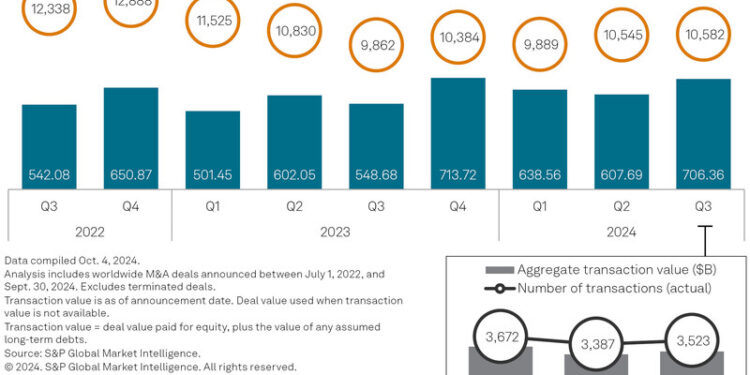Good morning. As voters choose the next U.S. president, there’s a question of how the markets will react to the results. Analysts in the banking sector are weighing in.
A report released on Nov. 1 by J.P. Morgan Wealth Management notes that following an election, volatility in the stock market may be elevated. However, since 1984 there’s only been one election year where the market was lower 12 months after the election—in 2000, when the equity markets were grappling with the bursting of the tech bubble. “The Nasdaq 100 and S&P 500 tech sector sold off by double digits, while other sector declines were much more muted or in some cases produced gains,” Alan Wynne, a global investment strategist, writes.
For capital markets to be significantly impacted, we would likely need a decisive outcome, “meaning a sweep of the Presidency and both houses of Congress,” Rob Haworth, senior investment strategy director for U.S. Bank Asset Management states in an Oct. 29 report. Without one-party control, it’s difficult for “the most significant policy proposals to take effect,” he explains, “and that’s when markets might become more reactive.”
However, it’s possible that the election winner’s broad policy initiatives could have some capital market impact at the sector level. For example, “if Republicans win, there is likely to be more of a push for development of fossil fuels, while a Democratic win might further promote development,” according to Haworth.
The Oct. 29 edition of Goldman Sachs’s “Top of Mind” report states that: “Uncertainty around the U.S. election remains high, and we continue to think the outcome could have important implications, especially around trade, immigration, and fiscal policy.”
The in-depth analysis compares the positions of Vice President Harris and Former President Trump on the federal corporate tax rate and tariffs, among other issues. There’s also a section where analysts discuss the implications of potential policy changes on the sectors they cover.
The banking sector, a bellwether for how the economy is doing, would be one to watch. Richard Ramsden of Goldman Sachs Equity Research writes: “The vast majority of bank earnings are domestic, and banks have fewer deductions than other sectors, which leaves bank earnings more sensitive to changes in the headline corporate tax rate than the average S&P 500 sector.”
Some experts think it’s a win-win situation for the market no matter who is elected president. A survey conducted by Bloomberg finds that about half of investors think the stock market will maintain its pace or accelerate under a Harris presidency, while 59% believe the same under a Trump presidency. The survey of 350 respondents made up of economists, portfolio managers and investors believe certain asset classes will boom under either candidate.
In two new reports, Fortune provides an analysis of the five stocks to buy or sell if Harris or Trump wins the presidential election.
Sheryl Estrada
[email protected]
Upcoming event: Join business’s brightest minds and boldest leaders at the Fortune Global Forum, convening November 11 and 12 in New York City. Thought-provoking sessions and off-the-record discussions feature Fortune 500 CEOs, former Cabinet members and global Ambassadors, and 7x world champion Tom Brady–among many others. See the full agenda here, or request your invitation.
The following sections of CFO Daily were curated by Greg McKenna
Leaderboard
Leopoldo Alvear was appointed CFO of French banking giant Societe Generale (ENXTPA: GLE), effective Jan. 7, as part of management reshuffle under new CEO Slawomir Krupa. He will succeed Claire Dumas, who will remain at the company through the end of January before leaving to pursue other opportunities, the bank said. Alvear arrives from Spanish rival Banco Sabadell, where he served in the same role for four years.
Richard Hallé was appointed CFO of Natural Grocers by Vitamin Cottage (NYSE: NGVC), effective Jan. 1. He will succeed Todd Dissinger, who will retire the day prior as previously announced. Hallé most recently served as a managing director of Alvarez and Marsal’s private equity performance improvement group. From 2011 to 2021, he was the CFO of online marketing company Vivial.
Big Deal
Global M&A kept rebounding in the third quarter as IPO activity continued to falter, according to a new report from S&P Global Market Intelligence. The number of global M&A announcements increased 7.3% compared to the same quarter last year, ending a streak of 10-straight quarters where announcements fell on a year-over-year basis. Global equity issuance dropped 33% from second-quarter levels and 21% compared to last year, however, coming in at $65.63 billion.
“Signs of recovery continue to dot the dealmaking landscape, and additional positive indicators in the fourth quarter should create a substantial amount of optimism for 2025 as further rate reductions from the Federal Reserve tend to lower the cost of acquisition financing,” said Joe Mantone, the lead author of the report.

Going deeper
“More Americans are renouncing their citizenship: Here’s who is leaving and why,” is a new feature from Fortune’s Alicia Adamczyk. Some so-called “accidental Americans,” U.S. citizens with little to no connection to the country, are tired of being on the hook for taxes to Uncle Sam. Those who try to renounce their citizenship, however, quickly discover the process is harder—and more expensive—than it looks.
Overheard
“I think that the next generation of these assistants and the Generative AI applications will be better at not just answering questions and summarizing the indexing and aggregating data, but also taking actions. And you can imagine us being pretty good at that with Alexa.”
— Andy Jassy, CEO of Amazon, said during the company’s quarterly earnings call on Thursday about what an AI-powered version of its voice assistant will look like, Fortune reported.







